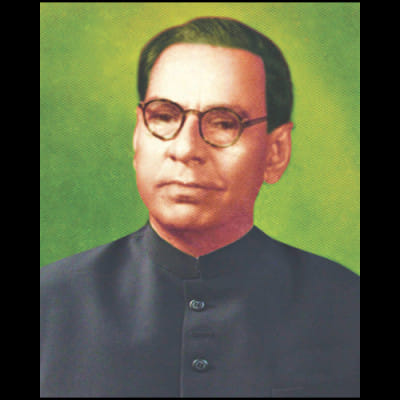Abul Mansur Ahmad's 39th anniversary of death today

Today is the 39th death anniversary of Abul Mansur Ahmad, a renowned litterateur, journalist, and politician of the sub-continent. He died in 1979.
One of the greatest satirists of Bangla literature, Abul Mansur Ahmad was a renowned politician, lawyer and very powerful journalist. He was a pioneer of modern and progressive journalism. He worked for prominent newspapers such as Krishak, Nabajug, Sultan, and Mohammadi, and was editor of the Kolkata based Daily Ittehad from 1946 to 1948. He wrote about the language issue from early forties and contributed to the Language Movement as the editor of the Ittehad.
A very successful politician, Abul Mansur Ahmad played a key role in the formation of the Awami Muslim League. He served as vice-president of the organisation from 1953 to 1958.
Abul Mansur Ahmad was the author of the famous Ekush Dafa (21-point programme) election manifesto of Jukta Front (a grand coalition of the three giants of our politics -- Sher-e-Bangla AK Fazlul Huq, Moulana Bhashani and Shaheed Suhrawardy) in the 1954 election through which the Muslim League was ousted from power. The Ekush Dafa was the first comprehensive articulation of the political, economic and cultural demands of the Bangalees of the then eastern part of Pakistan.
He was elected a member of East Bengal Provincial Assembly in that election, and served as health minister in the United Front cabinet under Sher-e-Bangla AK Fazlul Huq. In 1955, he was elected a member of Pakistan Constituent Assembly.
He was the minister for education in the United Front government of East Pakistan in 1956 and the minister for commerce and trade in 1956-1957. After the promulgation of martial law by Ayub Khan in 1958, he was imprisoned and subsequently released in 1962. He then retired from politics.
Abul Mansur Ahmad was known for his strong stand in favour of regional autonomy of East Pakistan. He also made remarkable contributions to industrialisation of the long neglected East Pakistan. He always propagated secularism in a manner unparalleled in the forties, fifties and sixties.
Abul Mansur Ahmad's publications include great satires like Aina, Asmani Purdah, Gulliverer Safar Nama and Food Conference. He also penned insightful works on social and political history of Bengal such as Bangladesher Culture. He has two autobiographical writings -- Atma Katha (About myself) and Amar Dekha Rajnitir Panchash Bachar (50 years of politics as I saw it).
Abul Mansur Ahmad was one of the greatest political personalities of the subcontinent who combined rare talents in three distinct fields -- politics, journalism and literary writing. He was born in 1898 in Dhanikhola village of Trishal, Mymensingh.
Marking his death anniversary, a discussion on “Abul Mansur Ahmader Khojey: Buddhadev Boser Sathe Tarker Sutra Dhore” will be held in Muzaffar Ahmed Chowdhury Auditorium (Faculty of Social Sciences) at Dhaka University on March 23 at 4:00pm.
Abul Mansur Ahmad Smriti Parishad and Gyantapash Abdur Razzak Foundation will jointly host the programme. Emeritus Professor Anisuzzaman will preside over the discussion while researcher Mohammad Azam will present the keynote paper. Essayist Hayat Mamud and researcher Murshed Shafiul Hasan will take part in the discussion.
In addition, an international seminar will be held at Netaji Subhas Open University in Kolkata on April 21 this year. Abul Mansur Ahmad Smriti Parishad and the Centre for Language Translation and Cultural Studies of the university's School of Humanities will jointly host the programme.
In 2015, five researchers were awarded for their works on Abul Mansur Ahmad -- Dr Nurul Amin, Dr Rajib Humayun, Dr Chengis Khan, Dr Mizanur Rahman, and Imran Mahfuz. A special honorary memorial award was given to Emeritus Professor Dr Rafiqul Islam for editing a six-volume work of Abul Mansur Ahmad.

 For all latest news, follow The Daily Star's Google News channel.
For all latest news, follow The Daily Star's Google News channel. 



Comments